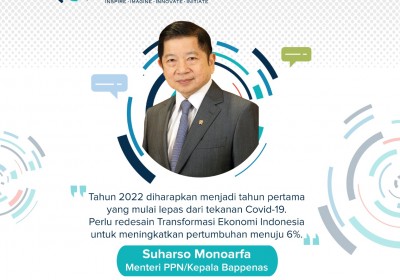Industrialization Strategies in Driving Post-COVID 19 Economic Transformation
May 16, 2021
JAKARTA – The government has pressed the importance of economic transformation policies to help grow the Indonesian economy going forward, emphasizing the importance of the industrial sector in driving the growth and sustainability needed.
“The year 2022 will be the first year where we can begin to truly shed the pressures subjected to us by the COVID-19 pandemic. In the years following the pandemic, Indonesia will require an economic growth rate of at least 6% to escape the middle-income trap in the future,” Minister of National Development Planning/Head of Bappenas Suharso Monoarfa said during the University Lecture #2 Road to Indonesia Development Forum (IDF) 2021 webinar on Wednesday (5/5).
“Indonesia’s challenges do not only lie in economic recovery, but also in economic transformation. This can be achieved by shifting the economic structure from lower productivity to a higher productivity sectors, and stepping up productivity in all those sectors,” the minister added.
To fulfill these goals, Bappenas have prepared 6 key post-COVID economic transformation strategies, with an aim to be inclusive and sustainable. These strategies include ensuring the Indonesian workforce remains competitive in the healthcare, education, and research sectors as well as the modernization of agriculture practices, maintaining the productivity of small-to-medium-scale businesses (UMKM) and continued industrialization efforts.
Other strategies include pushing carbon-efficient ‘green’ economic policies and circular economic policies, improving digital infrastructure, strengthening the domestic value chain, and a grand plan to relocate Indonesia’s capital city to help balance economic diversity in areas outside of Java.
Industrialization has been touted as a crucial factor in pushing Indonesia’s economic growth, with particular emphasis on investment and exports.
“We must push foreign direct investments (PMA) and domestic direct investment (PMDN) towards productive economic sectors that have high added value and are export-oriented, while also strengthening our export supply chain with domestic industries such as small-scale industries (IKM) and the halal products industry,” Minister Suharso said.
The minister noted that there needs to be greater optimalization of government spending and the domestic market through measures such as improving the industrial sector’s supply chain with the tourism industry, developing the creative economy and the use of the state budget to push domestic and small-scale industries.
Meanwhile, policies regarding the supply side must ensure the availability of input costs for production processes by pushing competitive prices of raw materials, improving the quality and availability of skilled and superior industrial human resources, and encouraging more industrial research and innovation.
The general idea of this approach is to improve the business climate and make it more conducive by facilitating the allocation of resources in accordance with its comparative advantages, increasing aggregate cross-sector and within-sector productivity, and reducing operational and service costs.
To ensure the success of these goals, the government will hold exploration, assistance and guidance programs on investment for priority sectors, develop integrated industrial zones, implement development policies in priority sectors based on Industry 4.0 concepts and comprehensively developing assistance programs for IKMs.
The planned implementation of Industry 4.0 policies on priority subsectors are part of an effort to create added value, strengthen competitiveness in the global market, and transitioning towards advancing and developing the industries.
The government has named 6 specific, high-productivity sectors that will be considered ‘priority’ status in the long run which are the food & beverage, textiles, electronics, automotive, pharmaceutical and medical equipment industries.
“An interesting factor I’d like to mention is that product resource specialization will depend on the standards of certain regions because we have yet to have a national standard,” Minister Suharso said.
Furthermore, the development of industrial zones will help encourage the creation of added value to natural resources, which tend to be concentrated on commodity exports. Exports to downstream natural resources will encourage investment and create productive jobs.
Government policies passed to assist the development of industrial zones will be carried out in an integrated and comprehensive manner to ensure that the zones fulfill industrial development targets.
Stay up to date with the Indonesia Development Forum 2021 through the Bappenas YouTube channel and information available on our various social media pages!
Indonesia’s Research Institutions Supporting the Development of the Electric Vehicle Industry
Indonesian Muslim Fashion and Cosmetics IKMs Shine at Dubai World Expo 2020
Govt Steps Up UMKM Transformation Efforts in the Midst of Pandemic Slowdown
Govt Encourages Promotion of IKM Products in Digital Era
Government Begins Developing Maritime Training Center in Makassar
Tweets by IDDevForum
